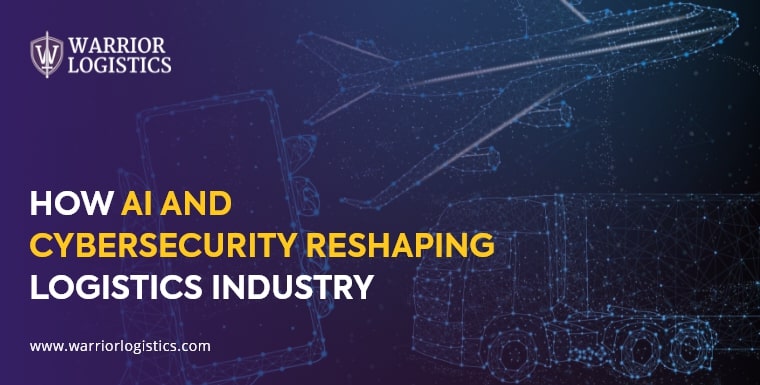How AI and Cybersecurity Reshaping Logistics Industry
In 2025, logistics is no longer just about moving freight; it’s about moving data, decisions, and trust at digital speed. The integration of artificial intelligence and cybersecurity logistics has become the new engine driving efficiency, visibility, and resilience across the global supply chain.
At Warrior Logistics, we’ve seen firsthand how automation and data intelligence can empower logistics leaders to do more with less, but only when protected by a solid logistics cybersecurity foundation. As cyber threats in logistics evolve, the industry must strike the right balance between innovation and protection.
The New Era of AI in Logistics: Driving Efficiency, Speed, and Smarter Operations
AI is no longer futuristic; it’s foundational. In logistics, AI is redefining route optimization, predictive maintenance, demand forecasting, and real-time visibility. By analyzing vast amounts of operational data, AI transforms how carriers and shippers make decisions every second.
So, How Does AI Work in Logistics?
AI-powered systems process real-time data from trucks, sensors, and warehouses to automate decisions that once relied on manual oversight. From dynamic scheduling to automated load matching, AI ensures every mile, minute, and message is optimized.
But with this growing reliance on connected technology comes increased exposure, which is where cybersecurity in the logistics industry becomes critical. Without proper protection, every connected system becomes a potential entry point for digital risk.
The Hidden Backbone: Cybersecurity Logistics in 2025
As logistics digitizes, cybersecurity logistics has become a mission-critical discipline. Every shipment, transaction, and data exchange relies on protected networks to maintain the integrity of freight movement. Cybersecurity in the logistics industry now extends beyond simple firewalls; it’s about safeguarding the entire ecosystem.
Think: Encrypted tracking systems, protected APIs between brokers and carriers, and AI-powered monitoring tools that detect anomalies before they cause damage.
Logistics security today requires real-time protection from sophisticated attackers who target freight systems, fleet management tools for cost analysis, and even warehouse automation networks. In 2025, cyber threats in logistics are no longer rare events; they’re everyday realities that demand proactive defense.
AI + Cybersecurity: The Powerful Partnership
AI doesn’t just optimize logistics, it strengthens cybersecurity, too. AI-based security tools now detect breaches faster, learn attack patterns, and adapt before threats escalate.
For example, AI in logistics can flag unusual shipment routes that may indicate hijacking attempts or data breaches. Similarly, AI reshaping cybersecurity allows logistics companies to deploy self-learning systems that analyze millions of data points to identify cyber risks instantly.
This integration is transforming cybersecurity in the logistics industry into an adaptive defense layer, one that evolves as quickly as attackers innovate.
Supply Chain Cybersecurity: The Frontline of Digital Freight Defense
In an interconnected world, supply chain cybersecurity is no longer optional. From manufacturers to carriers and third-party logistics providers (3PLs), every stakeholder shares a cybersecurity responsibility. Weakness in one node can compromise the entire chain. This is why cybersecurity in supply chain management has become a top priority for global shippers and logistics firms.
AI-driven tools can help monitor vendor compliance, automate risk scoring, and ensure that partners meet security standards. For logistics leaders, supply chain cybersecurity means protecting not just their own systems, but their customers’ data and reputation as well.
Common Cyber Threats in Logistics You Can’t Ignore
Let’s break down the cyber threats in logistics that are shaping the industry’s risk landscape in 2025:
- Ransomware attacks on TMS and WMS platforms
- Phishing scams targeting dispatch and driver communications
- GPS spoofing that alters shipment routes
- Data breaches exposing carrier and customer records
- Insider threats within connected supply chain networks
Every one of these issues directly affects logistics security, from operational downtime to revenue loss and damaged trust. Warrior Logistics invests in multi-layered defenses, from real-time monitoring to encrypted communications, to ensure every shipment moves securely across digital and physical networks.
Also Read: How Co-located Supply Chains Cut Freight and Inventory Costs
AI’s Broader Impact: How It’s Reshaping the Logistics Ecosystem
How is AI changing the logistics industry?
In 2025, AI serves as the industry’s central nervous system, forecasting demand, managing capacity, and reducing waste across every touchpoint.
AI doesn’t just automate, it enhances human decision-making. It delivers deeper insights into traffic patterns, fuel consumption, and lane optimization, which directly support line haul management, freight routing, and pricing precision.
What is an example of AI in supply chain management?
Predictive analytics models now forecast delays before they happen. For instance, AI can anticipate shipment bottlenecks based on weather or traffic data, allowing dispatchers to re-route in real time.
In the same ecosystem, AI reshaping supply chain management means more visibility, fewer disruptions, and smarter collaboration, but only when reinforced with robust supply chain cybersecurity.
The Growing Importance of Cybersecurity in Supply Chain Management
Every digital advancement introduces new vulnerabilities. As automation expands, cybersecurity in supply chain management ensures that connected freight systems remain resilient.
Companies now rely on blockchain, zero-trust frameworks, and AI-driven access controls to fortify their logistics security posture. This evolution aligns with the broader push for logistics cybersecurity as a shared responsibility across brokers, carriers, and shippers.
Cybersecurity in the logistics industry isn’t just about prevention; it’s about business continuity. At Warrior, we design our systems with resilience in mind, ensuring that no disruption, digital or physical, can break the chain of trust.
The Future of AI and Cybersecurity Logistics
Looking ahead, cybersecurity logistics will continue to evolve alongside AI innovation. Smart fleets, autonomous vehicles, and predictive maintenance will all depend on secure data frameworks.
AI will increasingly take on predictive defense, recognizing vulnerabilities before they’re exploited. Meanwhile, logistics security will expand beyond compliance to become a core differentiator for competitive logistics firms.
How is AI shaping industries overall?
Across manufacturing, healthcare, and logistics, AI is setting a new benchmark for operational intelligence and risk management. The logistics sector, however, faces a unique test: balancing automation efficiency with unbreakable digital security.
FAQs
Q1. How is AI changing the logistics industry?
AI is streamlining logistics operations by optimizing routes, automating workflows, and improving predictive analytics, making transportation faster and more cost-efficient. However, this requires stronger cybersecurity in the logistics industry to safeguard critical systems.
Q2. How is AI reshaping cybersecurity?
AI-driven cybersecurity systems detect and neutralize threats in real-time, strengthening logistics cybersecurity by preventing intrusions and ensuring data integrity across supply chain platforms.
Q3. How does AI work in logistics?
AI uses algorithms to process live operational data, enabling smart routing, inventory control, and line haul optimization, while maintaining logistics security against digital threats.
Q4. How is AI reshaping supply chain management?
It enhances visibility, predicts risks, and automates decision-making across the network, supported by strong supply chain cybersecurity protocols.
Q5. What is an example of AI in supply chain management?
Predictive tools that detect shipping delays, analyze vendor reliability, and flag cybersecurity anomalies are clear examples of AI’s role in modern supply chain systems.
Q6. How is AI shaping industries?
AI is redefining how industries operate, improving resilience, agility, and security. In logistics, it drives efficiency, while cybersecurity logistics ensures safe operations.
Warrior Logistics: Building a Secure, Intelligent Future
At Warrior Logistics, we believe innovation means nothing without integrity. As AI reshapes freight visibility and predictive performance, we anchor progress in uncompromising logistics security. Our technology-driven approach blends AI intelligence with supply chain cybersecurity, ensuring that every mile is monitored, every transaction is protected, and every partner operates with confidence.
With cybersecurity logistics at the core of our operations, Warrior continues to define what reliability looks like in the digital freight era, where data, drivers, and customers move forward as one.
-Ready to strengthen your supply chain with secure, AI-powered logistics?
Contact with Warrior Logistics, where innovation meets trust, and performance never compromises protection.




